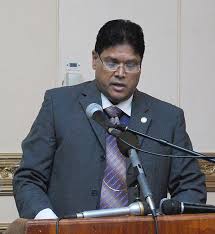Paramaribo, (Reuters) – Suriname’s National Assembly voted in former justice minister Chan Santokhi as its new president today, ending the rule of former strongman Desi Bouterse, who had dominated the country’s politics in recent decades.
Santokhi, of the Progressive Reform Party, won a majority of seats in the assembly in a May national election, ahead of Bouterse whose government oversaw the collapse of the South American nation’s economy despite the recent discovery of vast oil reserves.
“Our country is on the brink of financial collapse,” Santokhi told the assembly in a televised victory speech. “The government we form will pursue a coherent policy to work together towards that one goal: the recovery of Suriname.”
Bouterse, who led Suriname through the 1980s as head of a military government and then assumed office democratically in 2010, will stay on as president until Aug. 12.
In November, a court sentenced Bouterse to 20 years in prison for ordering the execution of 15 adversaries in the former Dutch colony who had spoken out against his seizure of power in a February 1980 coup. The 74-year-old is appealing the conviction.
French President Emmanuel Macron, in a statement, congratulated Santokhi and wished for greater cross-border cooperation between Suriname and neighboring French Guiana.









